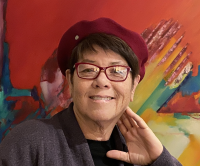Dr. June Newman

Biography
I am an adjunct psychology professor at Modesto Junior College and a full-time lecturer for the psychology department at California State University, Stanislaus where my focus is on research methods.
I spent my early years as an Army brat traveling to different countries as we were transferred from one Army base to another—which also meant changing schools often. Eventually, we settled down in south Orange County (next door to Los Angeles) and I spent my adolescence along the beach towns of SoCal. I had a passion for horses, so instead of going to college right away, I went to riding school instead. There I earned my teaching certificate, came home to teach riding and train horses for many, many years.
I love learning, so I became interested in attending the local community college just to feed my mind in other areas besides my equestrian pursuits. Initially, it was not about getting a degree, I was just hungry for knowledge—but eventually I was pushed into declaring a major and working toward earning a degree. By this time, I had moved to Modesto because most of my family had moved here and I began attending Modesto Junior College, looking to transfer into a 4-year college to get my degree in psychology. After MJC, I transferred to California State University, Stanislaus where I graduated summa cum laude with my BA in Experimental Psychology, an MA with distinction in psychology, and my Ed.D.with distinction in educational leadership.
As I was working on my degrees, I worked in public mental health to get applied experience that would supplement and enhance my education. Initially, I worked at an acute, locked, psychiatric facility to get clinical experience for graduate school. I then moved to outpatient services as a deputy public guardian for individuals who had been placed on LPS conservatorship—these are people who have been deemed by the court to be gravely disabled as a result of their severe and persistent mental illness. In this role, I was an advocate and proxy to help them in their recovery goals. I have also worked as a program director for several mental health recovery programs and a developmental disability day program.
So, teaching college is my third career and I often wonder what took me so long to get here, because I realized, rather late in life, that this what I really love to do. It allows me to indulge the lifetime learner in me and I get a tremendous amount of satisfaction helping others to achieve their academic goals; as well as seeing that light bulb go off when learning is happening. Reading this, it may seem that I jumped on the academic path and headed straight toward my degrees. Nothing could be further from the truth. At one point, I juggled five different part-time jobs while attending school full-time in order to pay for school and keep up with the bills. I was the first person in my family to earn a college degree. My path to a master’s degree was derailed for about six years as I battled some serious health issues. Consequently, I had to redo most of my coursework before finally earning the degree. This has all been extremely valuable because I can understand and relate to the struggles of many MJC students.

